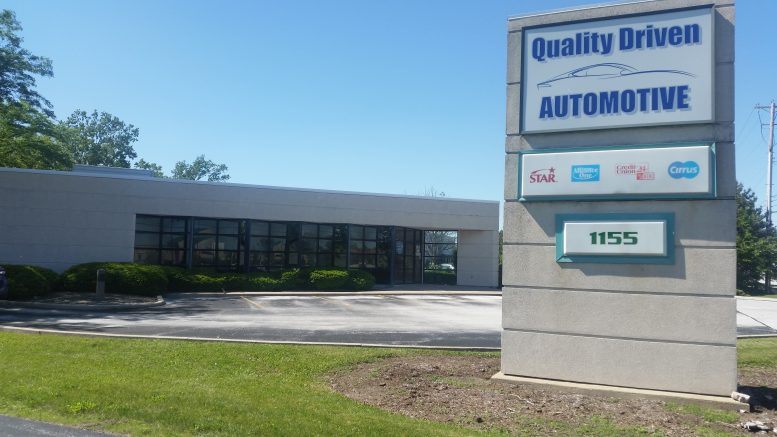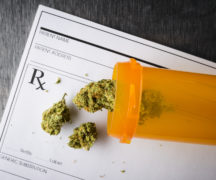By JAN LARSON McLAUGHLIN
BG Independent News
A Bowling Green location has been selected by the state as a provisional medical marijuana dispensary. The former Glass City Credit Union Building, at 1155 N. Main St., will be able to provide medicinal marijuana under the name Glass City Alternatives.
The State of Ohio Board of Pharmacy today awarded 56 medical marijuana provisional dispensary licenses. A total of 376 applications had been received.
A provisional license is a temporary license issued to an applicant for a medical marijuana dispensary license, authorizing them to begin establishing a dispensary. All provisional license holders have six months to demonstrate compliance with the dispensary operational requirements to obtain a certificate of operation.
Once a dispensary is awarded a certificate of operation, it can begin to sell medical marijuana to Ohio patients and caregivers in accordance with Ohio laws and rules.
The state had been divided into four quadrants for medical marijuana sales – with Northwest Ohio to have 10 dispensaries. The region was broken into districts, with Wood, Hancock and Henry counties being combined into one district to be allowed one dispensary. No applicants filed for locations in Hancock or Henry counties.
So that left Wood County to host a dispensary. The three applications filed with the State of Ohio Board of Pharmacy were for sites at:
- 106 E. Napoleon Road, Bowling Green, with the business name of Debbie’s Dispensary, filed by Sara Presler.
- 1155 N. Main St., Bowling Green, with the business name of Glass City Alternatives, filed by Mark Jacobs.
- 2701 Woodville Road, Northwood, with the business name of Serenity Dispensary, filed by Deitra Hickey.
House Bill 523, the Ohio law that in 2016 legalized marijuana for medical use only, tasked the Ohio Board of Pharmacy with determining which locations should be approved as dispensaries.
A total of potential 376 sites were submitted, though just 56 were approved, according to Grant Miller, spokesperson with the Ohio Board of Pharmacy.
The law requires 500 feet between any marijuana business and a school, church, public library or public playground.
“We have to make sure they are complying with the rule,” Miller said earlier this year. “It’s an in depth process. Obviously, there’s a lot that goes into the application.”
All the applicants were required to show the sites had proper commercial zoning, and that the community had not enacted a moratorium on the sale of medical marijuana.
“When it comes to dispensaries and the way they interact with areas, it’s really up to the local areas. In the end, it’s down to the local town, township or city,” Miller said. “We are judging them on the merits we required.”
In 2016, Bowling Green City Council considered a moratorium on medical marijuana, but decided against taking such action. The city attorney and city planning director suggested that council declare a moratorium until more definite rules came out from the state. Council was split, but decided to not declare a moratorium on a dispensary.
The North Main Street location is already zoned commercial, according to City Planning Director Heather Sayler.
The medical marijuana system in Ohio is to be operational by September.
Doctors must register with the state, which will require completing some type of continuing education about cannabis, before being able to recommend marijuana to patients with whom they have bona fide relationships. A physician is not permitted to issue a state of Ohio approved written recommendation to use medical marijuana until the physician has obtained a certificate to recommend from the State Medical Board of Ohio.
Certified physicians may recommend medical marijuana only for the treatment of a qualifying medical condition. Under Ohio law, all of the following are qualifying medical conditions: AIDS, amyotrophic lateral sclerosis, Alzheimer’s disease, cancer, chronic traumatic encephalopathy, Crohn’s disease, epilepsy or another seizure disorder, fibromyalgia, glaucoma, hepatitis C, inflammatory bowel disease, multiple sclerosis, pain that is either chronic and severe or intractable, Parkinson’s disease, positive status for HIV, post-traumatic stress disorder, sickle cell anemia, spinal cord disease or injury, Tourette’s syndrome, traumatic brain injury, and ulcerative colitis.
Individuals can petition the state medical board to add conditions.
All medical marijuana patients and their caregivers are required to register with the State Board of Pharmacy.
The following forms of medical marijuana are permitted: oils, tinctures, plant material, edibles and patches. The law prohibits the use of medical marijuana by smoking or combustion, but does allow for vaporization (vaping). The law prohibits any form that is attractive to children.
Currently, Ohio does not recognize medical marijuana registry cards issued in other states. The law requires that the Board of Pharmacy attempt in good faith to negotiate and enter into reciprocity agreements with other states.
For more information about the award process, the board developed the following resources which are now posted to the dispensary page (https://medicalmarijuana.ohio.gov/dispensaries) of the Ohio Medical Marijuana Control Program.



